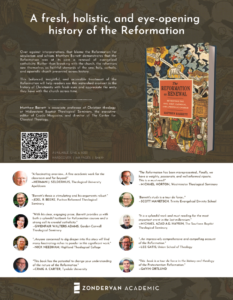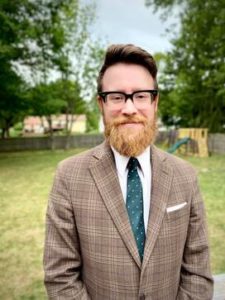
Ten Questions on Natural Theology
I n this interview, Credo Editor Lance English sat down with Jordan B. Cooper, a distinguished Lutheran scholar and theologian. During this captivating conversation, Cooper explores the profound significance of natural theology in today’s theological landscape. He navigates the delicate balance between reason and revelation, elucidating how natural theology harmonizes with Scripture to deepen our understanding of God’s nature. With a keen eye on the scholastic approach, he unveils how rigorous analysis and logical argumentation contribute to the construction of sound theological foundations. Additionally, Cooper graciously shares personal anecdotes, influential sources, and his vision for the future development of natural theology within the Protestant tradition.
n this interview, Credo Editor Lance English sat down with Jordan B. Cooper, a distinguished Lutheran scholar and theologian. During this captivating conversation, Cooper explores the profound significance of natural theology in today’s theological landscape. He navigates the delicate balance between reason and revelation, elucidating how natural theology harmonizes with Scripture to deepen our understanding of God’s nature. With a keen eye on the scholastic approach, he unveils how rigorous analysis and logical argumentation contribute to the construction of sound theological foundations. Additionally, Cooper graciously shares personal anecdotes, influential sources, and his vision for the future development of natural theology within the Protestant tradition.
1. What is natural theology?
Natural theology is the term that is used to define the things about God which can be known through reason. This includes empirical observations about the world, as well as logical inquiries from philosophy surrounding the nature of existence and the need for a first cause. There is also an internal inherent sense within the human soul of the reality of the divine which John Calvin called the sensus divinitatis. St. Paul refers to this natural theology as the things which are “clearly seen” by pagan and Christian alike, which is why the apostle can cite non-Christian philosophers as testimonies to truth about God’s relationship to the world (Acts 17:28). Even without God’s special revelation in Scripture, his existence and some of his attributes can be discovered by meditation upon his creation.
What can be known by means of natural revelation is significantly limited. While the non-believer does have a sense of God and his moral law (Rom. 2:15), the natural man or woman is totally unable to come to a knowledge of the Gospel apart from the clear proclamation of God’s word (Rom. 10:14-15). Special revelation is thus needed as the divinely appointed means by which the Holy Spirit works faith. However, this does not mean that natural revelation is wrong or useless. It is profoundly important for the intellectual lives of all people, as the human creature is able to gain true knowledge about the world even without explicit knowledge of Christ.
2. What are the strongest arguments or evidence from the natural world that support the existence of God?
The problem is that when no metaphysical assertions are made, then the contemporary world’s metaphysics are simply assumed. Click To Tweet I tend to think that arguments surrounding causality are the strongest. With that being said, they do take some work to explain, as when St. Thomas first proposed his five proofs of God’s existence, there were certain assumptions about the world which were taken for granted that his arguments rely on. This is no longer the case. Therefore, the strongest argument needs a discussion of what causes are, what purpose is, and how one thing causes another. David Hume has made the work here more difficult by his denial of the inherent connection between a cause and its effect. This has shaped modern people, mostly unconsciously, in a way that makes the causal arguments for God’s existence not so convincing.
However, when all of the background is explained, it remains a solid ground by which one can rationally assert the existence of God as a metaphysical necessity. This means bringing people out of the mindset of thinking of causality in solely linear terms (in other words, what happened before what in time). The more important questions are: why is there anything at all? How can a universe of contingent objects simply exist if they are all contingent? Where does motion come from? When all of the answers are tried, the inevitable logical conclusion is that there must be a non-contingent source of being and motion in other things. This is God.
3. Natural theology often involves complex philosophical and metaphysical concepts. How do you approach making these ideas accessible and relevant to a broader audience?
That has always been my goal, as quite a small portion of people has strong knowledge of the Greek philosophical categories which were once standard in the West. This is not only an issue among laity, but it is not uncommon to find well-known philosophers who profoundly misunderstand the causal language of Aquinas, for example. One might purport (and many do) that we could just simply get rid of the philosophical language altogether as an unnecessary hindrance to these conversations. While it might, perhaps, sound pious it is not quite so obviously the correct move to make.
The problem is that when no metaphysical assertions are made, then the contemporary world’s metaphysics are simply assumed by people . We do not live in a post-metaphysical world, but in a world with bad metaphysics. There simply is no escaping the ideas of being, existence, causality, or other traditional metaphysical constructs. It is only when thinking through these ideas clearly and distinctly that we truly begin to understand precisely where our current cultural mindset departs from a classical Christian one. In other words, the problems people have with Christianity and its application in the modern world are often metaphysical ones. Therefore, we have to deal with them.
In terms of bringing these to a non-philosophically educated audience, it is probably easier to do than is assumed. What is really important is to give specific examples of how changes in metaphysics have led our culture away from simple obvious fact—such as the difference between male and female. Once people start to understand how changing philosophical categories impact our own world’s issues, they begin to see that perhaps philosophy is not so abstract after all. In light of this, I always use a lot of examples to explain ideas, and I generally try to avoid unnecessarily complicated terminology or over-extensive use of Latin.
4. You’ve written a book on the loss of transcendence and the decline of the West entitled In Defense of the True, the Good, and the Beautiful. How does a diminished natural theology contribute to our collective loss of transcendence?
The history of modern philosophy can essentially be defined as the loss of transcendence in the Western world and its unfolding consequences. When Descartes adopted a mechanistic approach to the natural world and consequently relegated the spiritual to the inward human soul, he interiorized purpose, so that the external world was no longer viewed through the lens of teleology. This meant that the natural world simply is what it is. It is no longer viewed as part of one comprehensive reality of what God is the consistent ground and sustainer. The history of modern philosophy can essentially be defined as the loss of transcendence in the Western world and its unfolding consequences. Click To Tweet
In terms of natural theology, one can acknowledge the reality of the transcendent without an explicit orthodox confession of the Christian faith. Plato was a thinker of the transcendent, but I am not quite willing to place him in the communion of the saints as Clement of Alexandria may have been. The same could be said about Neoplatonists like Plotinus who had a lot of profound good to share with the world, though without an understanding of the Triune nature of God or of the incarnation. My point is that the loss of transcendence is, yes, a loss of Christianity in the West, but it is also a move away even from the non-Christian West.
This loss of any anchor in the transcendent has meant that people now have to create their own purpose in life, since in their view it is no longer simply given to them. People continue to look inward to find some kind of ground of their own being or reason for living. This endless search for some kind of inwardly self-derived joy leads to things like the gender crisis we currently see around us, along with increased rates of depression and anxiety. We have lost contact with our Creator or any sense that there is any objective reality to grab onto. This should lead the church to new ministry opportunities to provide care for souls who are left without any guidance at all.
5. Are there any particular authors who have significantly influenced your thinking and approach to natural theology?
There are a significant number of figures that I have been influenced by in thinking through questions of natural theology and the role of metaphysics in Christian theology. Probably unsurprisingly, I include Augustine in this list near the top, along with St. Anselm and Thomas Aquinas. My most significant historical influence here, however, is Johann Gerhard. In most of my work, he stands above all others in his influence on my ideas, as the great synthesis between Thomas Aquinas’s metaphysics and Martin Luther’s gospel-centered Reformational theology. Thus, if I had to pick just one historical figure, it would be Gerhard. I've been influenced by Augustine, Anselm, and Aquinas, but my most significant historical influence is Johann Gerhard. Click To Tweet
Along with these historical theological giants, there are some more contemporary authors who have impacted my thought on these issues. Edward Feser has probably done more than anyone else in demonstrating the importance of the shift away from classical metaphysics in the rise of modern philosophy—at least on a popular level. James Dolezal is probably the first thinker who turned me toward the earlier Protestant scholastic sources on some of these issues. I would also cite Etienne Gilson, Richard Muller, and David Oderberg as more recent thinkers who have impacted my formulation of natural theology.

